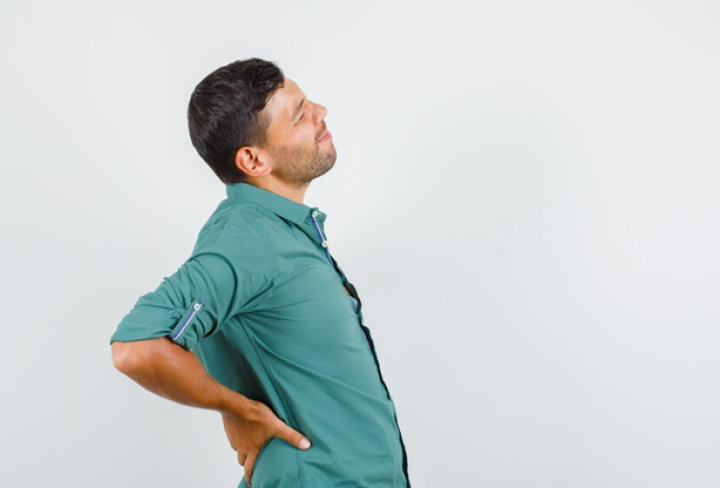A condition in which the outer wall of the disc weakens, resulting in a bulge that can press on adjacent nerves or other structures in the spine
The discs are soft cushions that rest between the bones of the spine
Symptoms of Disc Bulge
· Pain in the lower back, legs, or buttocks
· Numbness or tingling in the legs
· Pain or difficulty when sitting or standing for long periods
· Pain that worsens when walking, running, or bending
· Difficulty controlling bladder or bowel movements
· Stiffness in the lower back
Causes of Disc Bulge
· Sedentary Lifestyle
· Aging
· Weakened Back Muscles
· Trauma
· Bad Posture
· Obesity
· High Contact Sports or Activities
Diagnosis of Disc Bulge
Physical Examination – To assess your range of motion, muscle strength, and areas of pain
X-ray or MRI – To detect the location and size of the disc bulge
Treatment for Disc Bulge
Rest – Resting from activities can help reduce inflammation and pain
Physical Therapy – Exercises and stretches can help reduce pain, improve flexibility, and strengthen the muscles around the spine
Medications and Steroid Injections – To reduce pain and inflammation
Surgery – In severe cases of pain or other symptoms
Preventive Measures for Disc Bulge
1. Maintain a healthy weight: Excess weight can put additional pressure on the spine, leading to disc bulge. Maintain a healthy weight to reduce the risk of disc bulge.
2. Exercise regularly: Regular exercise helps to strengthen the muscles in the back and abdomen, which helps to support the spine.
3. Avoid lifting heavy objects: Lifting heavy objects can put additional strain on the discs in the spine, increasing the risk of disc bulge.
4. Practice good posture: Poor posture can put additional strain on the spine, leading to disc bulge. Maintain good posture when sitting, standing, and walking to reduce the risk of disc bulge.
5. Wear supportive shoes: Wearing supportive shoes can help to reduce the risk of disc bulge by providing additional support to the spine.
6. Take regular breaks: Take regular breaks from activities that involve sitting or standing for long periods of time, as this can put additional strain on the spine.
7. Use lumbar support: Use a lumbar support cushion when sitting or driving for extended periods of time. This helps to provide additional support to the spine.
Diet and Exercise for Disc Bulge
1. Avoid activities that cause strain on the disc, such as heavy lifting, pushing, pulling, or twisting.
2. Consume a diet rich in anti-inflammatory foods, including omega-3 fatty acids, fiber, and antioxidants.
3. Avoid foods that are high in saturated fats and processed sugars.
4. Increase water intake to keep the body hydrated and reduce inflammation.
5. Consume a balanced diet with plenty of fruits, vegetables, and whole grains.
6. Avoid caffeine and alcohol, as they can both aggravate disc bulges.
7. Consume natural supplements, such as glucosamine, chondroitin, and turmeric, to reduce inflammation and pain.
8. Speak to your healthcare provider about vitamins and minerals that can help reduce disc bulging.
9. Practice relaxation techniques and stress reduction methods, such as yoga and meditation.
10. Get plenty of rest and sleep to allow the body time to heal.
Dos and Don’ts for Disc Bulge
• Do exercise regularly to strengthen core muscles.
• Do perform stretching and low-impact exercises to improve flexibility.
• Do maintain proper posture, which can reduce stress on your spine.
• Do maintain a healthy weight to reduce pressure on your spine.
• Do perform regular chiropractic or physical therapy treatments.
• Do ice your back after activities that may have caused a strain.
• Don’t lift heavy objects.
• Don’t participate in activities that involve sudden twisting motions.
• Don’t smoke, as it can decrease your body’s ability to heal.
• Don’t sit for long periods of time.
• Don’t sleep on your stomach, as it can put extra pressure on your spine.
Myth and Fact on Disc Bulge
Myth: Disc bulges are caused by poor posture or bad posture habits.
Fact: Disc bulges can be caused by poor posture, but they can also be caused by arthritis, injury, or age-related degeneration.
Myth and Fact on Disc Bulge
Myth: Disc bulge is a serious medical condition.
Fact: Disc bulges are common and generally not serious. In most cases, disc bulges can be managed through conservative treatments like rest, physical therapy, medications, and lifestyle changes. However, if the pain persists or worsens over time, it is important to seek medical attention.
